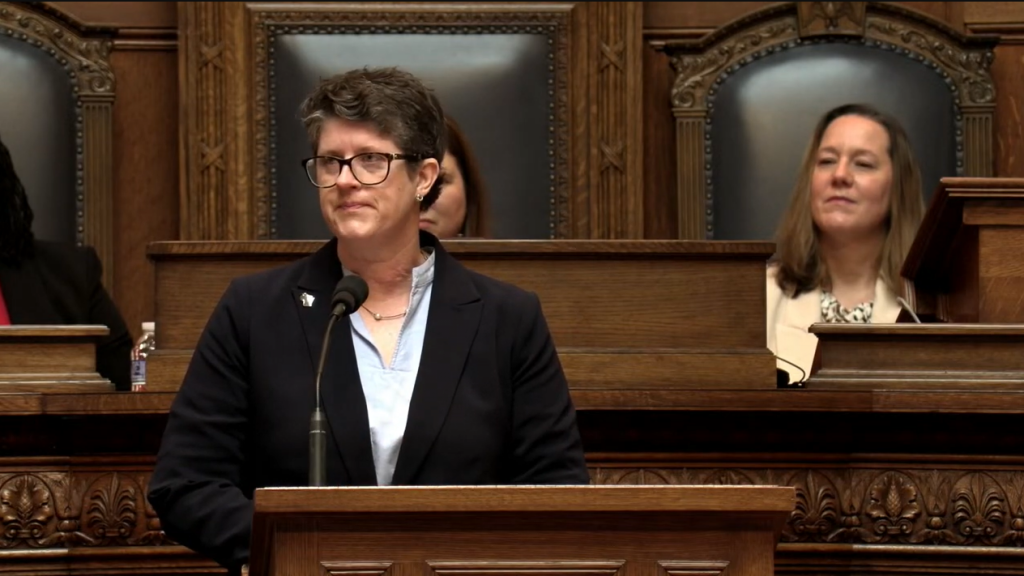As DEI Efforts Targeted, DPI Leader Wins Diversity Award
Superintendent Jill Underly notes challenges facing minority, LGBTQ+ students.

Underly accepted the 2024 Diversity Award from the State Council on Affirmative Action on behalf of her agency. (Screenshot via Wisconsin DOA YouTube)
Department of Public Instruction Superintendent Jill Underly became tearful Friday while speaking about a friend she knew in high school, who was kicked out of her home after coming out as gay to her parents.
“Her parents were furious. They said it went against everything they believed, everything they hoped for her, and when she started to cry her dad said, ‘I want you to give us the key’ and she said, ‘My key? My key to my car?’ and her mom chimed in and said, ‘No, the key to our house.’” Underly said, adding that the friend had to stay on another friend’s couch.
“When I saw her at school, she was so tired and worried. She said she missed her dog. She missed her bed. She missed her brother,” Underly said. “What this story teaches us is the critical lesson — inclusion begins at home. Our families play a critical role in fostering an environment of love and acceptance for everyone and other identities. But what about our schools? What about our teachers?”
Underly was accepting the 2024 Diversity Award from the State Council on Affirmative Action on behalf of her agency. She noted that many Wisconsin children are continuing to deal with mental health challenges with students of color and LGBTQ+ students facing disproportionate challenges.
“There’s so many kids who cannot be themselves at home, so they see school as that safe place of belonging,” Underly said.
The council established the Diversity Award in 2000 to “recognize state agencies, Wisconsin Technical Colleges and UW campuses for their strong commitment to the recruitment, retention and promotion of a diverse workforce as measured by the creation of programs, initiatives and practices.”
This year DPI received the award because of its work on its 2024-26 Equity and Inclusion Strategic Plan. The agency developed the plan in accordance with Executive Order 59, which Gov. Tony Evers signed in 2019. The order requires state agencies to create equity and inclusion plans and other strategic plans, analyze how much is spent by agencies for DEI activities, including for staffing, and review reported outcomes resulting from DEI activities.
DPI’s plan laid out the current status of diversity of the agency and laid out specific goals and actions that it could take to improve equity and inclusion, including addressing disparities throughout its hiring process, improving retention of staff from underrepresented and historically marginalized groups and fostering an inclusive community and creating a culture that is “respectful, free of bias and where accountability is present at all levels of the agency.”
“While a significant portion of public school students identify as being of color or of mixed races, a much smaller percentage of DPI staff and teachers reflect this diversity. Addressing this imbalance is vital,” the plan states. “To effectively serve all students, especially those from historically marginalized groups, it is crucial to enhance staff diversity throughout the educational system, from the DPI down to individual classrooms.”
The plan notes that among 576 permanent DPI employees in 2021-2023, an average of 11% were staff of color, 18% had disabilities and 3% were veterans.
One way the agency could improve its workforce diversity is by increasing outreach to and visibility of the state application and hiring process for DPI positions, the plan suggests.
Underly thanked Gov. Tony Evers for his dedication to diversity, equity and inclusion in her speech and said the award is a “testament to the dedicated efforts that the team at DPI, who built and continue to implement our equity and inclusion plan with passion and purpose.”
“We aren’t afraid of the politics, and we will support diversity. We will support equity. We will support inclusion and we will support belonging for employees, for our teachers across the state and for every single child,” Underly said.
The celebration of the agency’s DEI efforts comes in a year when efforts to foster diversity have been increasingly targeted by Republicans in the state. In May, Republicans launched an audit to look at DEI initiatives throughout state government, including to determine specific activities that are being performed in compliance with Executive Order 59.
At the time, Sen. Eric Wimberger (R-Green Bay) called DEI a “neo-Marxian philosophy meant to pit one socially-constructed class against another,” and said that Evers’ executive order “divided Wisconsinites into identity groups against each other’s benefit.”
Lawmakers in the last legislative session also introduced a bill to eliminate DEI statements and a proposed constitutional amendment to eliminate DEI throughout state agencies.
DPI’s interim communications director Chris Bucher told the Examiner in an email Friday that it “would probably be safe to assume” that similar efforts will come forward next legislative session as “some continue to seek to divide instead of bring us together.”
“All kids belong in Wisconsin’s schools, no matter their background, and our schools are some of the most diverse places. As you have seen with bills and rhetoric the last few legislative sessions, promoting inclusion and belonging in our schools has been coined by some as a negative thing,” Bucher wrote.
Bucher said the work of the department would not be affected by efforts to “minimize the unique backgrounds and perspectives of kids in our schools and meet their individual needs,” and that that the department would continue to advocate for inclusion.
“Our diversity is a strength, and as the needs of kids continue to grow, finding ways to improve belonging in our schools is critical,” he said. “We will continue advocating for our diverse schools to be places where all perspectives are welcome, and the provisions outlined in Dr. Underly’s budget proposal are a good starting point in achieving our goals.”
Underly has proposed spending an additional $4 billion for education, including increasing the state’s share of funding for special education, creating additional mental health supports, and implementing free school meals for all students and early literacy initiatives.
As DEI efforts are targeted, DPI is recognized for diversity commitment was originally published by Wisconsin Examiner.




















